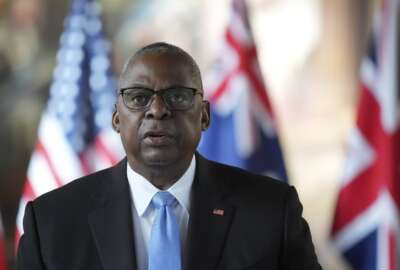STRATCOM nominee advocates for space, cyber superiority
President Barack Obama's nominee to take charge of U.S. Strategic Command told the Senate Armed Forces Committee that the Pentagon needs to double down on its s...
President Barack Obama’s nominee to take charge of U.S. Strategic Command told the Senate Armed Forces Committee that the Pentagon needs to double down on its strategic advantage in space and cyberspace to stay ahead of its adversaries.
Gen. John Hyten, currently the commander of Air Force Space Command, told members of the committee on Sept. 20 that he would support elevating U.S. Cyber Command as its own full unified combatant command.
“The cost of entry into cyberspace is very low — that’s the attractiveness for potential adversaries, because the cost of access is so low. So to respond to it … the most important thing, it has to be a whole of government response all the way through,” Hyten said. “From a military perspective, I think it’s essential that we look at cyberspace as a place where bad actors are. We need to be able to identify them, and if they’re threatening the United States, we need to be able to eliminate that actor from cyberspace. It’s the same as any other domain.”
Sen. John Mcain (R-Ariz.), the committee’s chairman, and Sen. Jack Reed (D-R.I.) the committee’s ranking member, both support CYBERCOM becoming its own combatant command.
Hyten told the committee that the United States needs to stay ahead of the rapid technological advances made by adversaries.
“We’re moving much slower in certain areas than our adversaries. We need our industry and our acquisition process to move faster,” he said.
Sen. John McCain, the committee’s chairman, added that Russia and China have been building systems “specifically designed to cripple U.S. systems,” in space, and added that the threat risk to national security satellites would be “deeply disturbing.”
Hyten told the committee that Russia and China have built up their space defense capabilities in a matter of years and months to compete with that of the United States.
“We have an amazing force structure in space, and both the Chinese and the Russians in particular have been watching those capabilities be employed on the battlefield for the last 20 years, and in response to that, they’re building counter-space capabilities to deny us those capabilities in conflict,” Hyten said.
If confirmed as STRATCOM commander, Hyten said he would seek greater collaboration with the private sector, which he said has been on the cusp of some strategic breakthroughs.
“The need to go fast is so important in today’s world, and many of our traditional processes are very slow. … The commercial sector has been on the verge of something special for a long time, but I think they’re about there, both on the launch side as well as the satellite side. I think in the not-too-distant future we’ll have perhaps ubiquitous communications, ubiquitous imagery. If that is the case, and that’s on the commercial side, we as a nation need to be able to take advantage of that,” Hyten said.
“I believe that it’s essential that we go faster in our responses. We’ve worked with the National Reconnaissance Office and all our joint space forces and developed what we call a space enterprise vision that looks out at the future and says ‘this is the kind of capability we need to operate in a world where conflict extends into space.'”
The four-star general also expressed concerns about vulnerabilities in the supply chain for electronic components, and encourage more dialogue with industry.
“Any time you’re talking about part supplies, you have to be partnered with the private sector — they’re going to generate the supplies one way or the other. I am concerned about the depth of our industry in terms of how many suppliers we have, how are they certified, how are the parts controlled. We have very significant concerns in space. As a commander of Strategic Command, I’ll be a demanding customer of the services that support U.S. Strategic Command,” Hyten said.
Copyright © 2024 Federal News Network. All rights reserved. This website is not intended for users located within the European Economic Area.
Jory Heckman is a reporter at Federal News Network covering U.S. Postal Service, IRS, big data and technology issues.
Follow @jheckmanWFED






